
Adventure Update- January 2008
January 1 January 5 January 15 January 23 January 24 January 27 January 29
February Update
___________________________________________
January 1, 2008
We left Cameroun for Nigeria today. Sharia Law, the code of life's behaviour for Northern Nigerian Muslims, is in effect here. Women are draped in colourful fabric and to show our respect, our women cover our shoulders and knees.
The road is gravel and stoney with vehicle-breaking potholes forcing our drivers to hold tight to the wheel and concentrate intently on the road. The landscape is dry, we are entering the Sahel (the shores of the desert). We bush camp behind a secluded koppie (hill). The Mandara Mountains stretch up in stoney, stubby rock formation.
In little towns, stalls line the road and sell diesel fuel in plastic containers. There is no fuel at garages...it is sold on the black market. At times, when fuel is available at certain garages, cars line up for hours to fill up. Plastic bags and rubbish form a layer of black and blue sand. We reach Mora, fill up and head for Parc de National Wasa. We pay R140 per person to enter the park. We arrange to carry only one Park Guide in our convoy and he rides with Slowy- not one in each car as required.
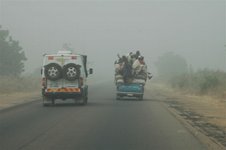
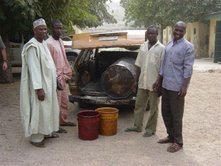
Hamathan dust Black market diesel
Wasa Park (Cameroun) The news that we cannot get a visa for Niger at the Nigerian border hits a hard blow. This has to be applied for at the Nigerien Consulate in Kano. Can we really cope with returning to Kano, the chaotic city, and face the dirt, poverty and manic traffic again? We have lunch and consider our options. We are adventurers and of course we can. NIGER The vegetables in Zinder are super and we stop at the market and restock … tomatoes, purple onions, little potatoes, eggplant, bright orange carrots, bananas, oranges and watermelon. Camels become the animal of choice for the harsh arid desert conditions and donkeys pull loads of fodder far too heavy for them. A donkey falls on his front legs because of his overloaded cart, and Slowie and Karl help him to push his cart of sand. Our aim is to arrive in Niamey where we will collect Dave and Matthew. Slowie , Leony and Moon will leave the group and return home. Niamey is 890 kms away which is a 3 day journey. The landscape changes – mostly far stretching desert sands of the Sahara Desert and sometimes beautiful rust coloured cliffs. Onion farming is prolific where there is water and markets appear in all villages. Beef Brochettes (kebabs) are grilled over open fires and are eaten in abundance. We bushcamp, once we have permission from the Chefferie of that area. Crowds of children surround our camp. We have completed 4300 kms. We fill the vehicles with washing water wherever we can. Water is one of our most needed resources, next to diesel. Photo opportunities abound, things we will never see again. A man carrying a Skinned sheep on his head. Cattle tied to the top of a lorry. A man carrying a car engine on his motorbike. The road is tar with vehicle breaking potholes gouged into it. The vehicles take strain. We camp in the desert for three nights and it’s magical. The girls cook – this is heaven. This is what we came for.
As we near Niamey, the tar road becomes smooth and beautiful and we drive along peacefully except for the Police stops. The landscape becomes greener as we get closer to the Niger River. Our travel books suggest the Sahel Hotel as a resting place and we decide that it is time to treat ourselves to a dash of luxury. Niamey, a decade ago, was a world producer of Uranium which brought in income allowing hotels, buildings, roads etc to be built. Now that the Uranium era has passed, all things have not prospered and hotels are rather dilapidated. The Sahel proves to be fine for our needs and we book in. We can service the cars, get washing done and enjoy the luxuries we have been without.
A savanah landscape edges a baked cracked road with giant elephant footprints inbedded into it. This makes the vehicles shake non-stop. We see a few giraffe, Kob antelope, Tsessebe, and a baby elephant wandering alone. Has its family been poached? We suspect so because the savanah is scorched black by fire and we could see 4 fires still burning in the park. This is often a tactic used by poachers to flush the game.
We leave Cameroun and head for the border. 37 kms of gouged dusty road brings us to the Nigerian borderpost at Banki.
Our arrival in Banki sets the overcrowded and chaotic tone of Nigeria. Busy, dirty, narrow dusty roads lined with stalls assault our vision. Fruit, cassava, diesel, cosmetics, tyres, hardware...anything you want is available for sale. Children in ragged clothing shake money tins begging. We go to customs and the procedure of methodically drawing columns by hand on the page and adding our details causes much toetapping.
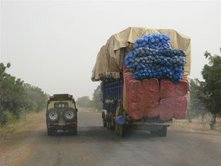
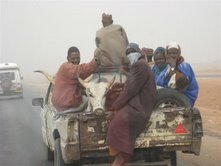
The Camel overtaking an overloaded truck Truck filled with a cow and people
We have entered Nigeria. We head for Magadurua where we change money from US dollar to 115 Nira.
The population of Nigeria is 150 million and its bursting at its seams. It is one of Africa's dirtiest countries with little infastructure and an environmental nightmare. Litter is piled up everywhere and canals are blocked with rubbish. Crowds block the roadside selling wares and motorbikes, cars and trucks dash around manically. The air pollution is so thick it chokes you.
We book into the La Chama Inn which is the most uncharming accomodation you can imagine. We hire one room with a unhygenic bath and toilet. We eat at their little restaurant room but we must take our own cutlery and crockery. The spicy beef takes a lot of chewing.
Return to top
____________________________________________________________________
5th January
We drive 600 km to Kano, the centre of Islamic Study in Nigeria. We drive through dust that comes from the Sahara (called the Hamattan) combined with an inversion and decide to switch on vehicle lights. We decide Nigerians are the most dangerous drivers we have seen in Africa. The taxis are overcrowded, overloaded and unroadworthy. An overturned taxi with 5 dead people is an awful sight. We assist at the scene.
We arrive at Kano and set up camp at the tourist camp which is acceptable. A few problems arise when Garth's radio packs up but he manages to solder and repair it. Pam buys a new battery and it sorts the problem. We take an organised tour into Kano. A visit to the indigo dye pits of Kano, owned for over 500 years by one family, is most intriguing and the girls end up buying beautiful indigo fabric. We climb the Dala Hill and overlook the old walled city of Kano which is over 1000 years old. The old city wall, which was built to protect the city, lies mainly in piles of sand but must have been grand in its day. Markets and traffic block the road. Kano has a population of 2 million. In the morning, the Iman calls his people to prayer in a melodious tone and the rooster joins in with his bit.
We now leave for Niger.
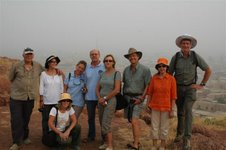
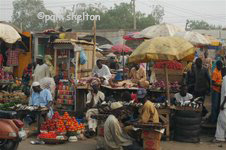
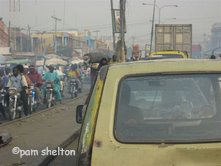
Group overlooking Kano Kano marketplace Kano traffic 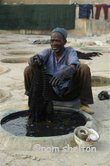
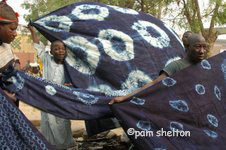
Famous indigo dye pits of Kano We buy indigo fabric 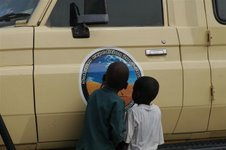
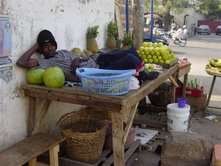
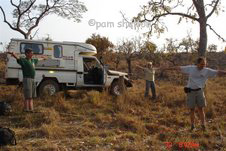
Children examing our vehicles Using watermelon as pillow Gail's exercise class
Return to top
____________________________________________________________________
We travel back 137 kilometres of potholed tarred road to Kano to apply for visas. We return to the Kano Touriste Camp – our home – to dirty toilets and water that stops running just when you are lathered in “mosquito killing” soap. Five times a day we listen to the melodious call of the muezzin as he calls his people to prayer…and the camp rooster adds his bit. The next day we are up bright and early to apply for our visas at the Nigerien Consulate. We are promised visas in a day but the eventual time period is FIVE DAYS.
Each day we return to the Consulate and the reason given eventually is that there is unrest in Niger and they cannot grant us permission to enter the country. We “camp” every day at the Consulate’s office waiting for the visas – we request audience with him and are finally given our visas to visit Niger with the provision that we do not travel in the north to Agadez and the Air Mountains where there may be bandit activity. We have no choice but to change our itinerary to head to Niamey from Zinder. This is a trying time for us as we are anxious to be moving.
We clear the Nigerian Customs at last. Niger has a population of 10 million people. Most of the country comprises a vast expanse of largely uninhabited Sahelian desert with the only areas of significant population along the southern edge of the Niger River. The landscape changes as we enter Niger and see fewer people walk along the roadside compared to bustling Nigeria. We have numerous police stops and a sense of orderliness exudes. At the Nigerien border, we were given a Paige Routier, which when shown at each Police stop, opens the way for us to proceed. Police often ask for a ‘cadeau’ or gift which could be a sweet or cigarette.
The pitted potholed road causes the vehicles to swerve and realign and drivers had to be alert. Many long-legged sheep, goats, Bororo cattle, donkeys, camels and carts share the road. At 4:30, we begin to look for a camp site as everyone is tired by then.
Half of the population of Niger is of the Hausa tribe with the majority practicing the Muslim religion. The Tuaregs make up 10% of the population. The Tuareg uprisings in the 1990s, caused the death of tourism and hotels were left empty. Few people visit Niger. A dry desert landscape supports villages of square mud huts built in surprising modern ‘Moorish’ design with an arrangement of millet granaries on stilts for storing grain. These are the homes of the Hausa people. The rainfall is low, 100 mm a year. Camel grass, green against the tawny desert sand, camels and oases edged with palm trees, creates a tapestry different to anything we have seen before.
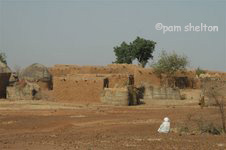
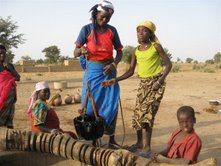
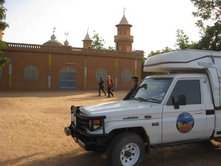
Hausa village Girls at a well Mosque
We arrive in Zinder and are escorted to a police station to sign in. We are told the officer is at prayers and we must wait. We are taken to a dark Tourist Camp out of town by a motorcyclist. The camp has not been used for 10 years and we are given the use of a toilet and a shower. We see what was once a bedroom standing empty with a rat-eaten mattress tossed on the floor. We arrive in the dark and the noise of tinned food being opened is audible as we make supper.
Guides arrive the next morning to take us into Zinder to visit the Sultan’s Palace. We had visited a few palaces during the trip and these had proved to be a waste of time. Typically they are run down hovels and cost exorbitant prices for a tour. We fill up with diesel and make our way to the Palace where we have been promised an audience with the Sultan. We take gifts such as jam, cigarettes and books. The palace is built of thick sand walls with turrets. There are 12 rooms for past Sultans wives and Palace guards are dressed in robes of green and red. When it comes to the time to have an audience with the Sultan, we are ushered into his chamber only to learn that we are supposed to have made an appointment to see him. We had been caught!!
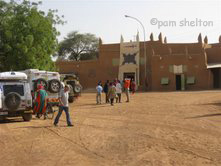
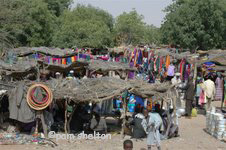
Our vehicles in front of palace Niger market
The desert stretches around us for kilometres and suddenly, out of the darkness, a Tuareg appears on his camel. This is like a photo we might see in a magazine and we all reach for our cameras to capture the moment. Children sing and the moment is precious. Hausa men arrive to serenade us, accompanied by a two string musical instrument. Juno dances with them.
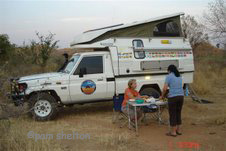
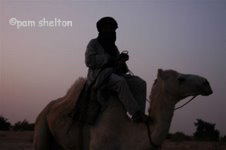
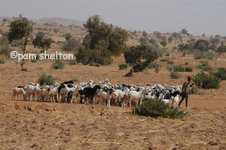
Gail and Leony cooking dinner Tuareg comes out of the desert Sheep of the Sahal

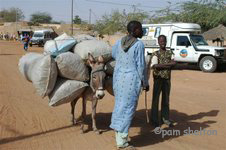
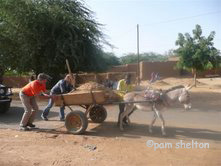
Transporting a roof Donkey carries a heavy load Slowie and Karl helping a donkey
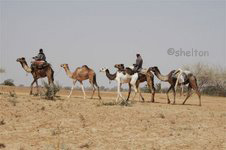
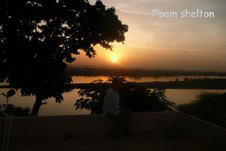
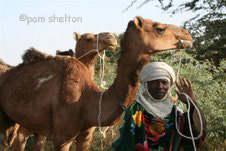
Camel caravan Erna enjoys the sunset on the Niger River..... Tuareg with his camels
Return to top
_________________________________________________________________________
January 23
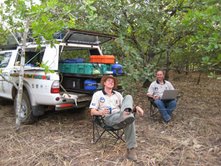
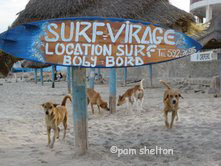

Matt and Dave set up bush camp...........Arrival in Dakar.............Fishing village in Dakar
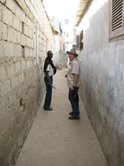
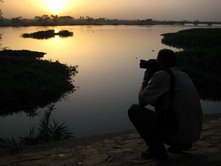
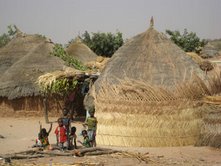
Guided tour in Dakar .......Sunset in Niamey...........Village in Southern Niger
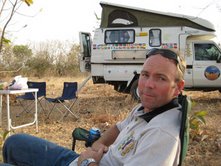
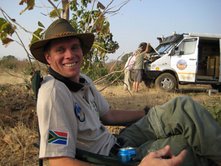
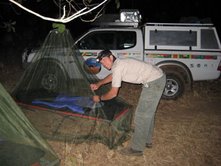
...............Matt.....................and Dave in bush camp.......................Dave sets up for sleep
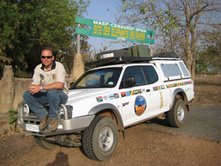
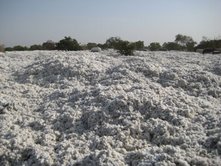
Matt outside elephant park in Benin......Cotton depot in Northern Benin
Return to top
________________________________________________________
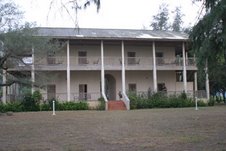
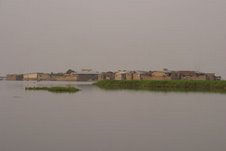

Grand Popo Hotel.................... The Venice of Africa......... Fishing south of Grand Popo
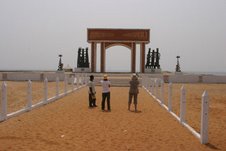
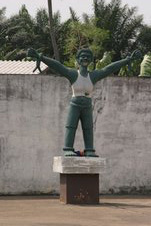
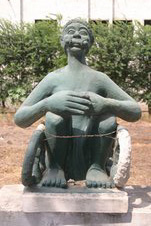
Port of no return (slaves shipped from here) ...........Monuments to slavery
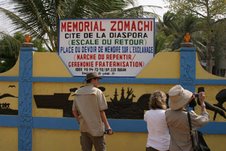
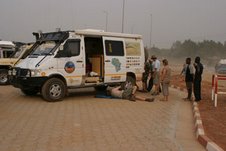
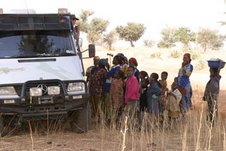
Slavery museum..................Roadside repairs.........................Roadside stop
Return to top
___________________________________________________________________
January 27
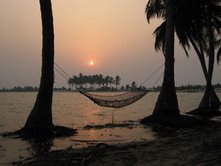
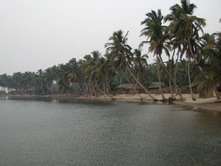
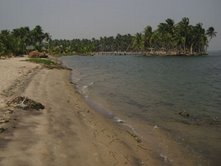
Ada sunset.............................Ada camp...............................Ada beach
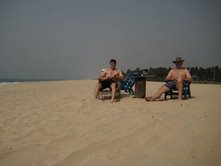
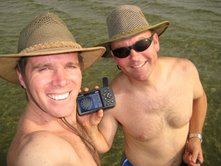
Passing the time in Ada.................At 6N 1W........
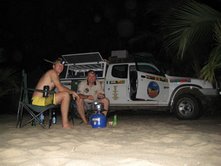
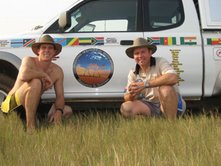
Solo in Ada....................Post confluence
Return to top
___________________________________________________________________
The Sahel Hotel sits on the bank of the mighty Niger River, one of the four largest rivers in Africa. We had many chores to accomplish in Niamey. Erna, Karl and Pam required visas for Benin and we all applied for visas to Mali. The Toyotas and Mercedes went for service, and the service was most efficient even to putting plastic on the seats to keep them clean.
In the evenings, we sipped gins and beers on the deck overlooking the river watching pirogues as they glide to the shore. Dinner of tasty beef brochettes (kebabs), chips and green beans satisfy the hungry travelers.
We took a drive across the Port Kennedy Bridge over the Niger River and explored the town driving through dusty villages. Magnificent vegetable gardens form never ending green ribbons along it. We have seen the four great rivers of Africa…the Congo, the Niger, the Zambezi and the Nile.
Three of our group flies back to South Africa and we welcome Matt and Dave. Their excitement at joining the trip is palpable. Matt and Dave’s suitcase was delayed in Johannesburg and we were lucky it was sent on the following evening.
We pack up and depart for Benin.
BENIN
We enter Benin on a good tarred road which cuts through the dry Sahel landscape. The largest tribe in Benin is the Fon, followed by the Yoruba who live in the south of Benin. The nomadic Peul (Fulani) men and women dress in bright fabric and their faces are decorated with tattoos and face paint. They wear beautiful jewelry creating a very glamorous appearance.
Benin is a very organized country. People chose their own religion which creates a harmonious living situation. This may be Muslim, Christian or Voodoo. Voodoo is practiced widely.
We fill the vehicles with water at a local well where the children operate the foot pump for us. We find the animals are treated with greater care as there are fewer vehicles so the animals are necessary for everyone’s livelihood.
We are able to buy baguettes (French bread), vegetables and fruit along the road which turns our shopping into absolute pleasure. Bags of wood for sale, burned to charcoal, line the road in abundance which causes great deforestation.
The Beninese staple diet of yams, millet and farina are sold along the road and are lined up for kilometers. Cotton is grown on a large scale and overloaded trucks pass us leaving a white cotton trail along the roadside.
We travel to Abomey to visit the Palace of the Dahomey which was built in the 17th century. Heritage sites are not well maintained in Africa although the Palace was recently preserved by an Italian restoration crew. Of interest, the throne of King Glele supported by four human skulls, along with other memorabilia, demonstrates the brutality of this early regime.
En route to Cotonou the two Mercedes begin to have problems. The Sprinter has sheared a shackle and the Gelandewagen has a fuel injector problem. We decide to bypass Cotonou and book into the Grand Popo Hotel along the gulf of Guinea coast. The colonial hotel is a wonderful break after bush camping for two nights. The two vehicles head off to spend a day in Cotonou for repairs
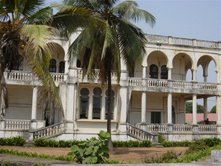
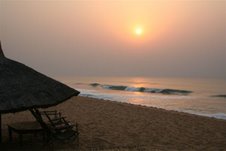
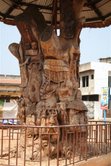
........Grand Popo Hotel....................Gulf of Guinea at hotel.........Slave tree of forgetfulness
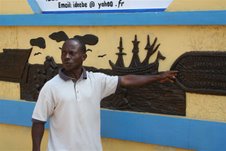
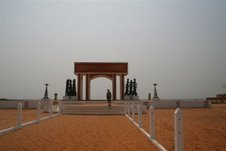
Our guide in Ouidah................. Gate of no return in Ouidah
No visit to Benin is complete without a visit to the route des Esclaves (the slave route) in Ouidah. The walk is a 3.5 km stretch of red sandy road leading from the slave market in town to the waiting ships. During the capture time, slaves were badly treated, left in the dark in horrific rooms until they were sent off to the ships. Next, we visit the Python Temple to view the ceremonial live pythons in the pit. The pythons are an object of veneration or of fear, used in voodoo sessions. A python was thrust around Gail’s neck which she handled with great aplomb and Pam managed to step backwards onto a python pile in a dark corner and give herself a fright.
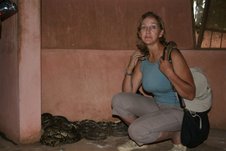
.......Gail with Python
The two vehicles are repaired and we will leave for Togo shortly. In the meantime we are enjoying the Grand Popo hotel immensely.
TOGO
Togo is a small country with a 56 KM shoreline. Lome is the capital with extensive markets along the roadside. The people of Togo are of the Ewe tribe. Togo’s major exports are coffee and cocoa. Vegetable gardens are planted alongside the city roads juxtaposition against the Chevron Oil Refineries.
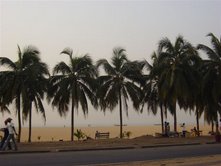
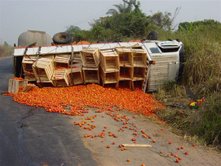
Market meets the shore in Lome, Togo...... Overturned truck a common sight
Our border crossing into Togo runs smoothly and in two hours we traverse the country. Problems occur as we attempt to get a border visa into Ghana. The officials no longer issue visas at the border. We are forced to return to Lome in Togo to secure our visas at the Ghana Embassy. Dave and Matt carry on to Ada Foah to wait because they have a 5 country visa that includes Ghana, obtained in South Africa. The Embassy is closed and we need to overnight at the Chez Alize in Lome. The owner is kind and allows us to camp on his property. The Ghanaian consular is very arrogant and chides us for not obtaining our visas in South Africa. Eventually, after paying a large bribe, we are able to obtain visas that same day. We proceed into Ghana where we hurry to meet Matt and Dave before dark. They have found a spot at the Estuary Beach Camp. The road is tar with huge potholes which slows down our journey. 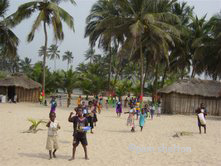 .....
..... 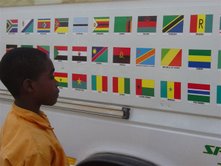 ...........
...........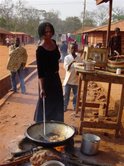
Children in Ada Foah,Ghana.........Boy examines our flags........Lady cooking vetkoek (dough cakes)
We reach Ada Foah at night and as the camp is at the confluence of the Volta and the Gulf of Guinea, we need to deflate the tyres to less than two bar to negotiate the one km trip across the soft sand. When we wake in the morning to a view of the sunrise on the ocean and Volta River, we realize that Matt and Dave have chosen an ideal camping spot. We learn that we need to leave immediately for Accra to obtain visas for Burkina Faso. Inflating the tyres again takes up precious time.
Accra is a huge city but the Consul is extremely obliging and issues us with our visas in a few hours. It takes us ages to navigate our way out of Accra to Kumasi. As night fell, Karl and Erna take a side road and find a small hut whose owner is happy to have us camp in his front yard.
We head for Baobeng-Fiema Monkey sanctuary. We take a guided walk in the forest and see many Black and white Colobus and Mona monkeys which are protected by the villagers who consider the monkeys as sacred.
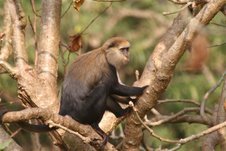
As we head toward the border to Burkina Faso we pass over the Black and the White Volta Rivers.
We arrive in Ouagadougou, a busy capital city which is clean and modern. We book into the Amiso Hotel where we pay $100.00 per room which is pricey but we have no choices. Karl is having his car rechecked and we hope to be on our way to Mali this afternoon.